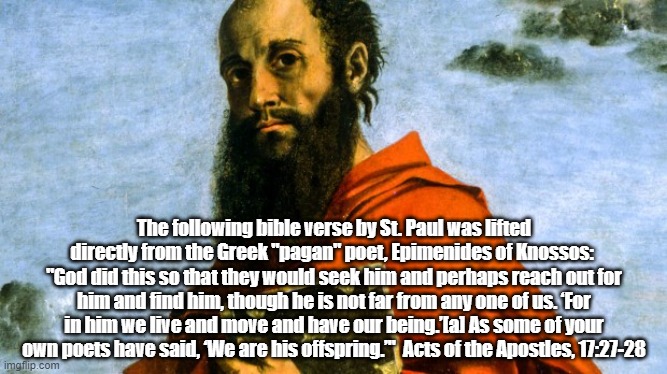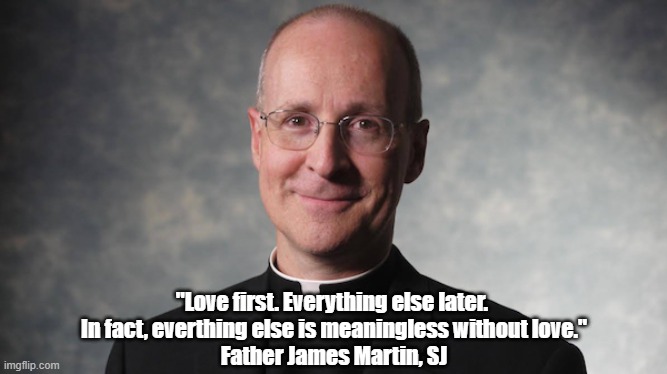Dear Fred,
There is truth in what you say: "Baptist/fundie/literalist contempt for science might actually be a necessary rebuke of the social sciences..."
But it is proportionately more significant that "the fundies" spurn science -- whether "hard" or "soft" -- whenever it contradicts their religious beliefs.
Alternatively, I agree with Aquinas that frank contradiction between terrestrial truth and God's Truth cannot exist.
"Arguing against those who said that natural philosophy was contrary to the Christian faith, (Aquinas) writes in his treatise "Faith, Reason and Theology that "even though the natural light of the human mind is inadequate to make known what is revealed by faith, nevertheless what is divinely taught to us by faith cannot be contrary to what we are endowed with by nature. One or the other would have to be false, and since we have both of them from God, he would be the cause of our error, which is impossible." "Aladdin's Lamp: How Greek Science Came to Europe Through the Islamic World" by John Freely
Although there is plenty of nonsensical psychological pseudo-science, it is a signal achievement of the 20th century that modern psychology limned the existence of "the personal shadow," "the group shadow" and "projection psychology."
And "fundamentalists" deny these realities, in large part because they are committed to the Old Testament's Thunder Sky God who, as you know, is not the only God in the Old Testament. (Old Testament prophets spent a hugely disproportionate amount of time/energy railing against the atavistic faithlessness of their fellow Jews.)
"The fundies" deny the realities of "shadow" and "projection" because they are determined NOT to undergo the spiritual turmoil and metanoia that would deprive them of their self-arrogated status as American "exceptionalists" and "smiters sitting at God right hand " who have carte blanche to whoop any "darkie's" ass whenever "the spirit moves them."
"The Deadly Oppression Of Black People: Best Pax Posts"
Have you read any de Chardin?
I don't think de Chardin is "absolutely" right. (It may well be that we can never determine what is "absolutely right," and if we do, it's mostly in "small things.")
However, I do believe that de Chardin's religious metaphors are better-suited to life as now lived, which is not to say that the essence of the human condition has changed.
It is to say that we are very different people than we were as recently as John Wayne - just ponder the "cowboys and Indians" motif that enveloped our youth - not to mention the superstition-saturated, pre-scientific, patriarchal, largely-illiterate people of agricultural (and nomadic) bible times... which is not to say that agriculturalists and nomads don't have invaluable insight and life experience.
Consider life-long farmer Wendell Berry:
Wendell Berry: American Prophet
Over the last couple of nights, I watched "The Searchers" - perhaps The Duke's best-known film - and was astonished by how many of the suppositions that Americans held about "cowboys," "Indians," and "manliness" have changed since the film was made in 1956. (That "The Searchers" was directed by John Ford is even more flabbergasting.)
I encourage you to watch this film and see if you don't feel more sympathy for the Indians than for the white guys - even though Ford's intent was antipodal.
"Why I Consider Friend Fred's View Of Native Americans Wrong"
I recently had similar reaction to Disney's "Johnny Tremain." Watch the prolonged scene in which "buckskin-camouflaged" Minute Men, hidden in hedge-rows, pick off marching "red coats" one by one. (The "stupid" "red coats" were dressed in red to make sure that combatants were readily distinguishable from civilians - perhaps the high-water mark of "moral" war-making. And we gringos see fit to laugh at them.)
I watched "Johnny Tremain" with my Danny and all I could see were terrorists detonating roadside explosives.
When "the fundies" acknowledge the reality of anthropogenic global warming and "shadow/projection psychology," then we'll discuss "the details."
Pax on both houses
Alan
PS Other interesting bits from Aquinas:
"The good is to be done and pursued and evil is to be avoided" is not very helpful for making actual choices. Therefore, Aquinas believes that one needs one's reason to be perfected by the virtues, especially prudence, in order to discover precepts of the Natural Law that are more proximate to the choices that one has to make on a day to day basis. http://www.aquinasonline.com/Topics/natlaw.html
"The only-begotten Son of God, wanting to make us sharers in his divinity, assumed our nature, so that he, made man, might make men gods." (This process has been given the name "theosis." http://en.wikipedia.org/wiki/Theosis)
Aquinas thought is also found on page 460 of The Catholic Catechism: "The Word became flesh to make us "partakers of the divine nature": "For this is why the Word became man, and the Son of God became the Son of man: so that man, by entering into communion with the Word and thus receiving divine sonship, might become a son of God." "For the Son of God became man so that we might become God." "The only-begotten Son of God, wanting to make us sharers in his divinity, assumed our nature, so that he, made man, might make men gods."" http://www.askacatholic.com/_webpostings/answers/2008_07JULY/2008JulyHowCanMenBecomeGod.cfm

The teaching about deification of a Christian can be found as early as in the works of Irenaeus, a Greek Father who was a head of the church of Lyons (c. 130–202) e.g. in the preface to his Adversus Haereses vol. 5. Athanasius of Alexandria was an author of the phrase about Jesus Christ which has become popular in Christmas homilies: "He was made human so that he might make us gods" (De incarnatione 54,3, cf. Contra Arianos 1.39). Divinization in the context of the Eucharist was taught by Gregory of Nyssa and Cyril of Alexandria. The term never meant for them breaching the absolute ontological distinction between God and his creation.[2]
There were many different references to divinization in the writings of the Church Fathers.
In the second century, Irenaeus, bishop of Lyons (c. 130–202) said that God had "become what we are, that He might bring us to be even what He is Himself."[3] He added:
Do we cast blame on him [God] because we were not made gods from the beginning, but were at first created merely as men, and then later as gods? Although God has adopted this course out of his pure benevolence, that no one may charge him with discrimination or stinginess, he declares, "I have said, Ye are gods; and all of you are sons of the Most High." ... For it was necessary at first that nature be exhibited, then after that what was mortal would be conquered and swallowed up in immortality.[4]
At about the same time, Clement of Alexandria (c. 150–215), wrote: "Yea, I say, the Word of God became a man so that you might learn from a man how to become a god."[5] Clement further stated that "[i]f one knows himself, he will know God, and knowing God will become like God. . . . His is beauty, true beauty, for it is God, and that man becomes a god, since God wills it. So Heraclitus was right when he said, 'Men are gods, and gods are men.'"[6] Clement of Alexandria also stated that "he who obeys the Lord and follows the prophecy given through him ... becomes a god while still moving about in the flesh."[7]
Justin Martyr c. 100–165) insisted that in the beginning men "were made like God, free from suffering and death," and that they are thus "deemed worthy of becoming gods and of having power to become sons of the highest."[8]
Athanasius, bishop of Alexandria (c. 296–373), stated his belief in literal deification: "The Word was made flesh in order that we might be made gods. ... Just as the Lord, putting on the body, became a man, so also we men are both deified through his flesh, and henceforth inherit everlasting life."[9] Athanasius also observed: "For the Son of God became man so that we might become God."[10][11]
Augustine of Hippo (354–430) said: "But he himself that justifies also deifies, for by justifying he makes sons of God. 'For he has given them power to become the sons of God' [referring to John 1:12]. If then we have been made sons of god, we have also been made gods."[12] "To make human beings gods," Augustine said, "He was made man who was God" (sermon 192.1.1). Augustine goes on to write that "[they] are not born of His Substance, that they should be the same as He, but that by favour they should come to Him... (Ibid)".
Other references to divinization in the writings of the Church Fathers include the following:
https://en.wikipedia.org/wiki/Divinization_(Christian)# - Divinization (Christian)
I hasten to add that perilous danger surrounds speculation concerning human divinization.
As Gandhi put it -- and I "quote" from memory: "Although every drop of ocean water participates in the nature of "ocean" no single drop is The Ocean." It is crucial to keep this ontoogical distinction present to mind always.
I generally have at least 2 or 3 insights before breakfast, and another dozen during the afternoon.
Today, I'm realizing that the Baptist/fundie/literalist contempt for science might actually be a necessary rebuke of the social sciences which are faux from top to bottom. The puke of modern psychology and sociology, the utter masquerade of certainty and spurious statistics causes a worldwide stench and our Baptist/fundi/literalists cousins cry in horror -- unfortunately they are a bit misdirected when they crash into real science
But think on how much you and I and and they might agree on a critique of social science.
--
Fred Owens
cell: 360-739-0214
My blog is Fred Owens
send mail to:
Fred Owens
35 West Main St Suite B #391
Ventura CA 93001





No comments:
Post a Comment